Therapeutic Person-Centered Relationships
VerifiedAdded on 2023/06/10
|14
|3518
|148
AI Summary
This essay analyzes the importance of establishing a therapeutic relationship with patients by analyzing a case study. It also assesses the code of conduct nurses should follow as laid down by the Nursing and Midwifery Board of Australia. The concepts of paternalism and self-efficacy are also described in the essay.
Contribute Materials
Your contribution can guide someone’s learning journey. Share your
documents today.
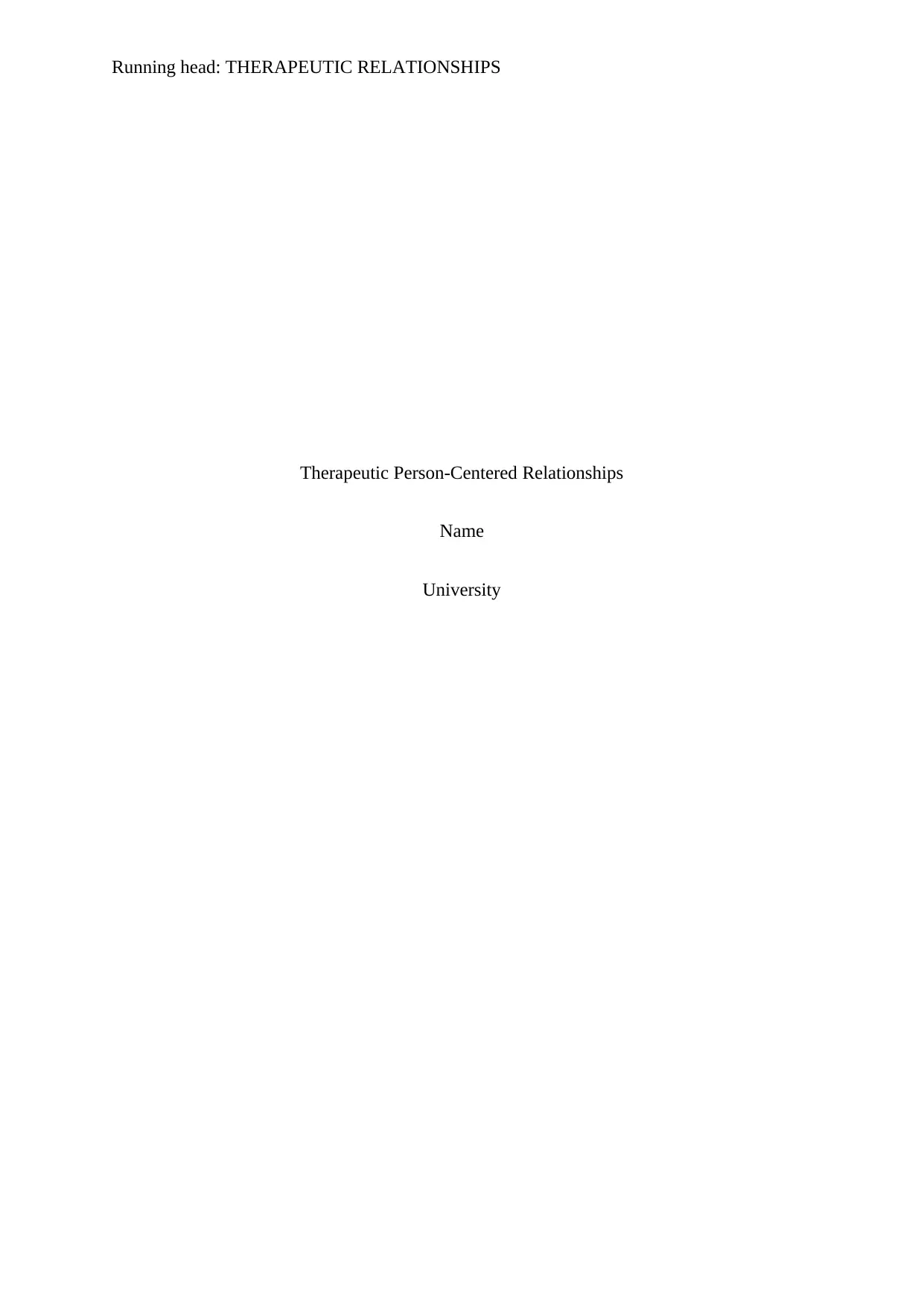
Running head: THERAPEUTIC RELATIONSHIPS
Therapeutic Person-Centered Relationships
Name
University
Therapeutic Person-Centered Relationships
Name
University
Secure Best Marks with AI Grader
Need help grading? Try our AI Grader for instant feedback on your assignments.

THERAPEUTIC RELATIONSHIPS 2
Abstract
The purpose of this essay will be to look at the importance of establishing a therapeutic
relationship with patients by analyzing a case study. The essay will also assess the code of
conduct nurses should follow as laid down by the Nursing and Midwifery Board of Australia.
The concepts of paternalism and self-efficacy will also be described in the essay.
Abstract
The purpose of this essay will be to look at the importance of establishing a therapeutic
relationship with patients by analyzing a case study. The essay will also assess the code of
conduct nurses should follow as laid down by the Nursing and Midwifery Board of Australia.
The concepts of paternalism and self-efficacy will also be described in the essay.
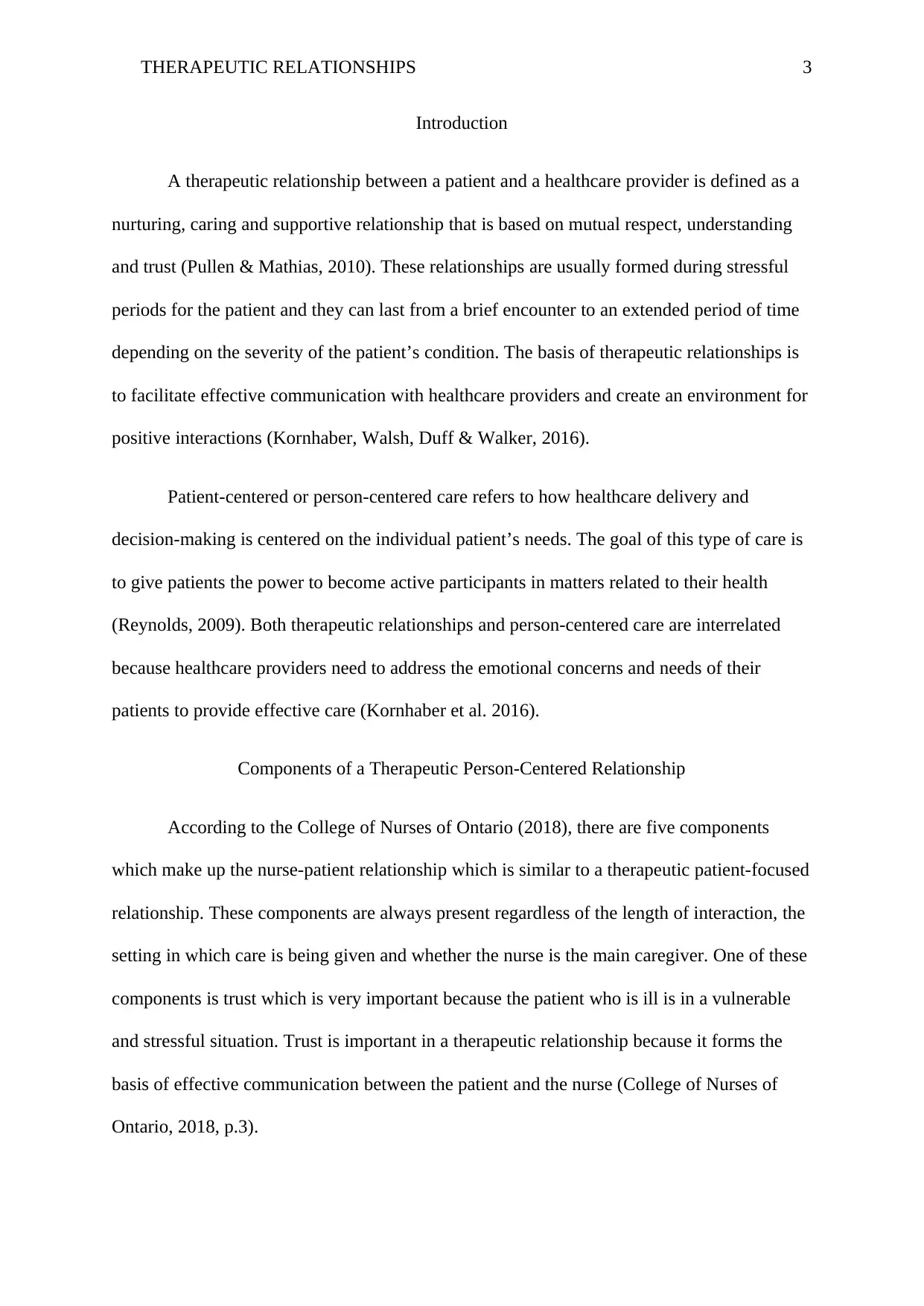
THERAPEUTIC RELATIONSHIPS 3
Introduction
A therapeutic relationship between a patient and a healthcare provider is defined as a
nurturing, caring and supportive relationship that is based on mutual respect, understanding
and trust (Pullen & Mathias, 2010). These relationships are usually formed during stressful
periods for the patient and they can last from a brief encounter to an extended period of time
depending on the severity of the patient’s condition. The basis of therapeutic relationships is
to facilitate effective communication with healthcare providers and create an environment for
positive interactions (Kornhaber, Walsh, Duff & Walker, 2016).
Patient-centered or person-centered care refers to how healthcare delivery and
decision-making is centered on the individual patient’s needs. The goal of this type of care is
to give patients the power to become active participants in matters related to their health
(Reynolds, 2009). Both therapeutic relationships and person-centered care are interrelated
because healthcare providers need to address the emotional concerns and needs of their
patients to provide effective care (Kornhaber et al. 2016).
Components of a Therapeutic Person-Centered Relationship
According to the College of Nurses of Ontario (2018), there are five components
which make up the nurse-patient relationship which is similar to a therapeutic patient-focused
relationship. These components are always present regardless of the length of interaction, the
setting in which care is being given and whether the nurse is the main caregiver. One of these
components is trust which is very important because the patient who is ill is in a vulnerable
and stressful situation. Trust is important in a therapeutic relationship because it forms the
basis of effective communication between the patient and the nurse (College of Nurses of
Ontario, 2018, p.3).
Introduction
A therapeutic relationship between a patient and a healthcare provider is defined as a
nurturing, caring and supportive relationship that is based on mutual respect, understanding
and trust (Pullen & Mathias, 2010). These relationships are usually formed during stressful
periods for the patient and they can last from a brief encounter to an extended period of time
depending on the severity of the patient’s condition. The basis of therapeutic relationships is
to facilitate effective communication with healthcare providers and create an environment for
positive interactions (Kornhaber, Walsh, Duff & Walker, 2016).
Patient-centered or person-centered care refers to how healthcare delivery and
decision-making is centered on the individual patient’s needs. The goal of this type of care is
to give patients the power to become active participants in matters related to their health
(Reynolds, 2009). Both therapeutic relationships and person-centered care are interrelated
because healthcare providers need to address the emotional concerns and needs of their
patients to provide effective care (Kornhaber et al. 2016).
Components of a Therapeutic Person-Centered Relationship
According to the College of Nurses of Ontario (2018), there are five components
which make up the nurse-patient relationship which is similar to a therapeutic patient-focused
relationship. These components are always present regardless of the length of interaction, the
setting in which care is being given and whether the nurse is the main caregiver. One of these
components is trust which is very important because the patient who is ill is in a vulnerable
and stressful situation. Trust is important in a therapeutic relationship because it forms the
basis of effective communication between the patient and the nurse (College of Nurses of
Ontario, 2018, p.3).
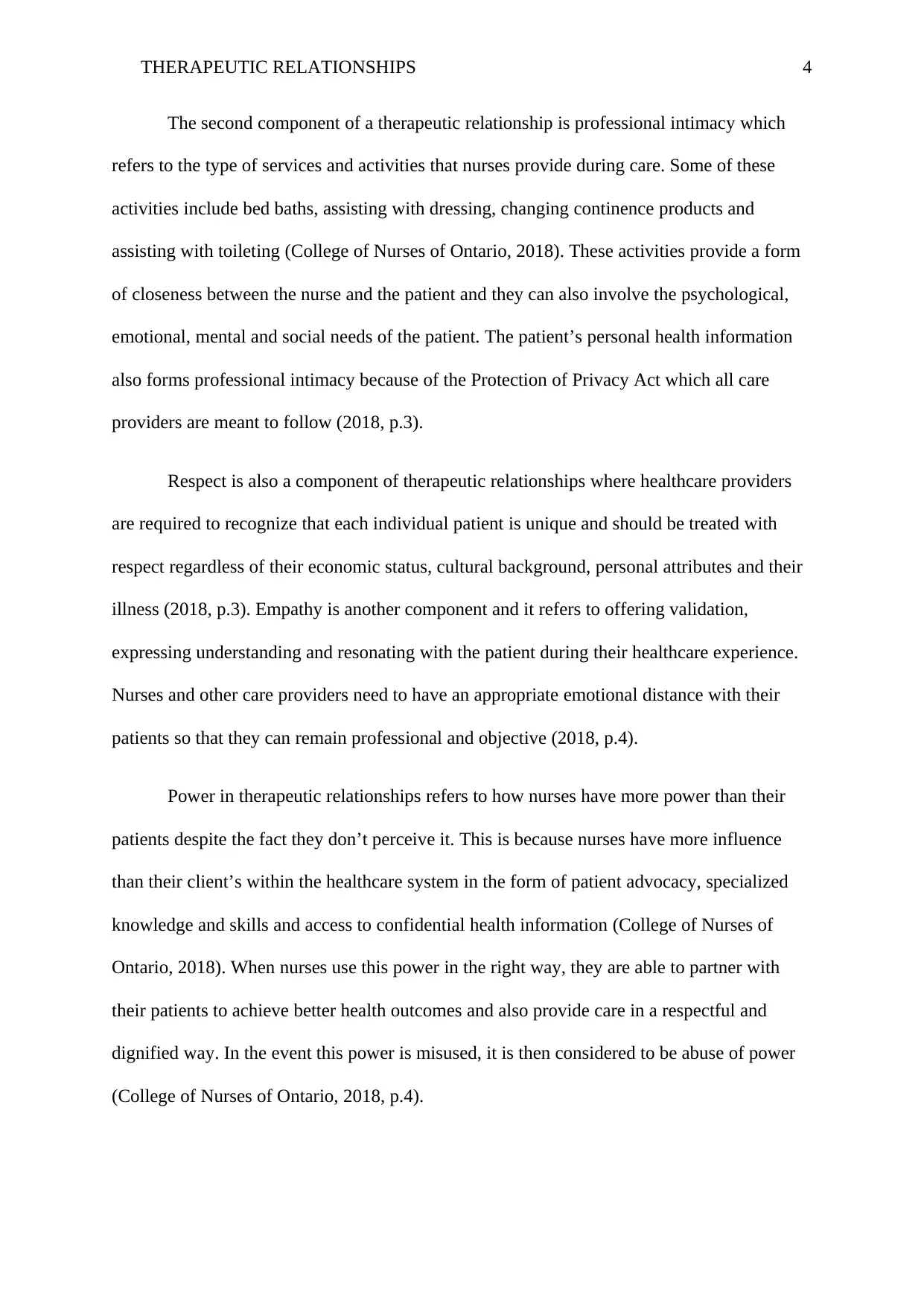
THERAPEUTIC RELATIONSHIPS 4
The second component of a therapeutic relationship is professional intimacy which
refers to the type of services and activities that nurses provide during care. Some of these
activities include bed baths, assisting with dressing, changing continence products and
assisting with toileting (College of Nurses of Ontario, 2018). These activities provide a form
of closeness between the nurse and the patient and they can also involve the psychological,
emotional, mental and social needs of the patient. The patient’s personal health information
also forms professional intimacy because of the Protection of Privacy Act which all care
providers are meant to follow (2018, p.3).
Respect is also a component of therapeutic relationships where healthcare providers
are required to recognize that each individual patient is unique and should be treated with
respect regardless of their economic status, cultural background, personal attributes and their
illness (2018, p.3). Empathy is another component and it refers to offering validation,
expressing understanding and resonating with the patient during their healthcare experience.
Nurses and other care providers need to have an appropriate emotional distance with their
patients so that they can remain professional and objective (2018, p.4).
Power in therapeutic relationships refers to how nurses have more power than their
patients despite the fact they don’t perceive it. This is because nurses have more influence
than their client’s within the healthcare system in the form of patient advocacy, specialized
knowledge and skills and access to confidential health information (College of Nurses of
Ontario, 2018). When nurses use this power in the right way, they are able to partner with
their patients to achieve better health outcomes and also provide care in a respectful and
dignified way. In the event this power is misused, it is then considered to be abuse of power
(College of Nurses of Ontario, 2018, p.4).
The second component of a therapeutic relationship is professional intimacy which
refers to the type of services and activities that nurses provide during care. Some of these
activities include bed baths, assisting with dressing, changing continence products and
assisting with toileting (College of Nurses of Ontario, 2018). These activities provide a form
of closeness between the nurse and the patient and they can also involve the psychological,
emotional, mental and social needs of the patient. The patient’s personal health information
also forms professional intimacy because of the Protection of Privacy Act which all care
providers are meant to follow (2018, p.3).
Respect is also a component of therapeutic relationships where healthcare providers
are required to recognize that each individual patient is unique and should be treated with
respect regardless of their economic status, cultural background, personal attributes and their
illness (2018, p.3). Empathy is another component and it refers to offering validation,
expressing understanding and resonating with the patient during their healthcare experience.
Nurses and other care providers need to have an appropriate emotional distance with their
patients so that they can remain professional and objective (2018, p.4).
Power in therapeutic relationships refers to how nurses have more power than their
patients despite the fact they don’t perceive it. This is because nurses have more influence
than their client’s within the healthcare system in the form of patient advocacy, specialized
knowledge and skills and access to confidential health information (College of Nurses of
Ontario, 2018). When nurses use this power in the right way, they are able to partner with
their patients to achieve better health outcomes and also provide care in a respectful and
dignified way. In the event this power is misused, it is then considered to be abuse of power
(College of Nurses of Ontario, 2018, p.4).
Secure Best Marks with AI Grader
Need help grading? Try our AI Grader for instant feedback on your assignments.
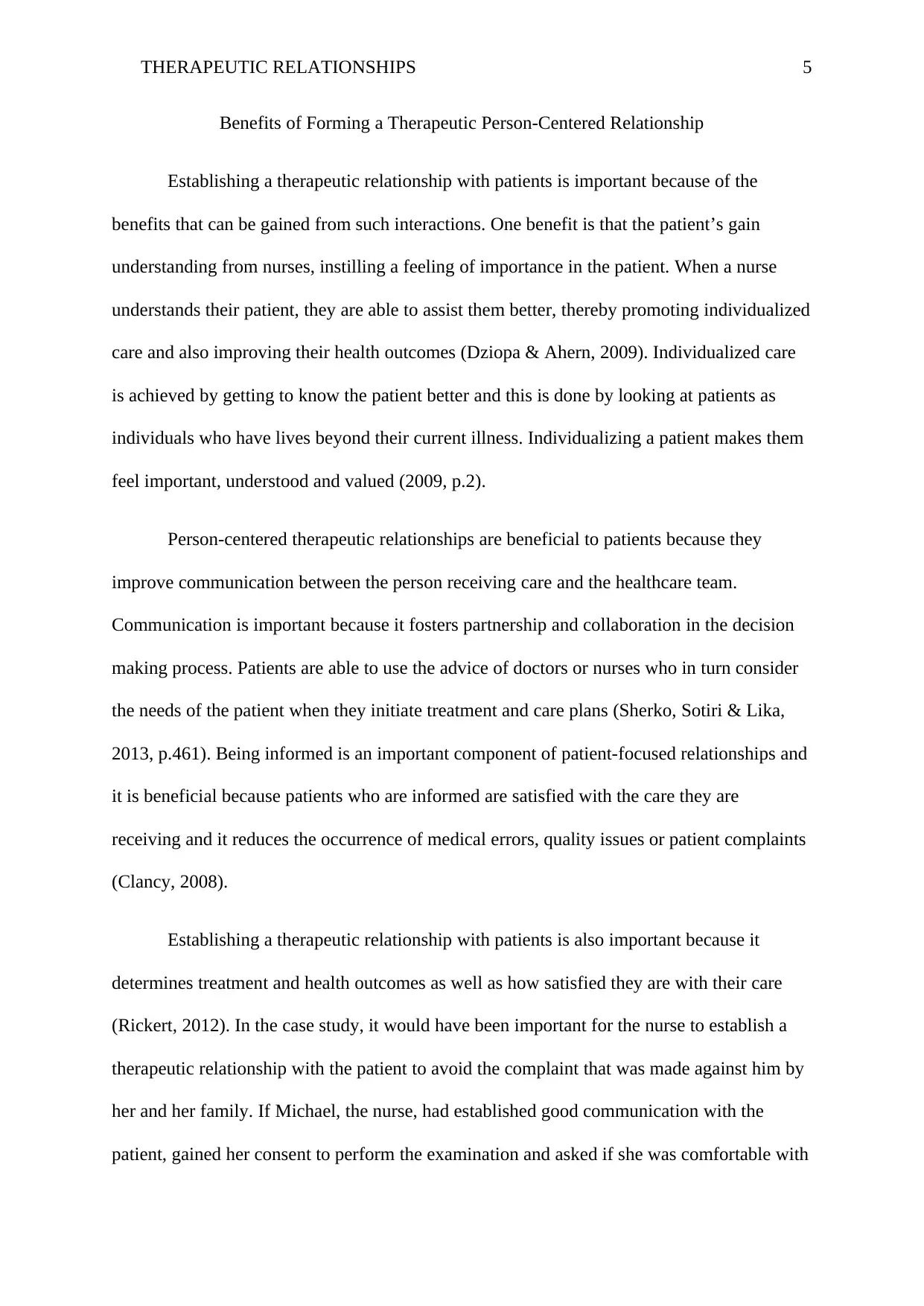
THERAPEUTIC RELATIONSHIPS 5
Benefits of Forming a Therapeutic Person-Centered Relationship
Establishing a therapeutic relationship with patients is important because of the
benefits that can be gained from such interactions. One benefit is that the patient’s gain
understanding from nurses, instilling a feeling of importance in the patient. When a nurse
understands their patient, they are able to assist them better, thereby promoting individualized
care and also improving their health outcomes (Dziopa & Ahern, 2009). Individualized care
is achieved by getting to know the patient better and this is done by looking at patients as
individuals who have lives beyond their current illness. Individualizing a patient makes them
feel important, understood and valued (2009, p.2).
Person-centered therapeutic relationships are beneficial to patients because they
improve communication between the person receiving care and the healthcare team.
Communication is important because it fosters partnership and collaboration in the decision
making process. Patients are able to use the advice of doctors or nurses who in turn consider
the needs of the patient when they initiate treatment and care plans (Sherko, Sotiri & Lika,
2013, p.461). Being informed is an important component of patient-focused relationships and
it is beneficial because patients who are informed are satisfied with the care they are
receiving and it reduces the occurrence of medical errors, quality issues or patient complaints
(Clancy, 2008).
Establishing a therapeutic relationship with patients is also important because it
determines treatment and health outcomes as well as how satisfied they are with their care
(Rickert, 2012). In the case study, it would have been important for the nurse to establish a
therapeutic relationship with the patient to avoid the complaint that was made against him by
her and her family. If Michael, the nurse, had established good communication with the
patient, gained her consent to perform the examination and asked if she was comfortable with
Benefits of Forming a Therapeutic Person-Centered Relationship
Establishing a therapeutic relationship with patients is important because of the
benefits that can be gained from such interactions. One benefit is that the patient’s gain
understanding from nurses, instilling a feeling of importance in the patient. When a nurse
understands their patient, they are able to assist them better, thereby promoting individualized
care and also improving their health outcomes (Dziopa & Ahern, 2009). Individualized care
is achieved by getting to know the patient better and this is done by looking at patients as
individuals who have lives beyond their current illness. Individualizing a patient makes them
feel important, understood and valued (2009, p.2).
Person-centered therapeutic relationships are beneficial to patients because they
improve communication between the person receiving care and the healthcare team.
Communication is important because it fosters partnership and collaboration in the decision
making process. Patients are able to use the advice of doctors or nurses who in turn consider
the needs of the patient when they initiate treatment and care plans (Sherko, Sotiri & Lika,
2013, p.461). Being informed is an important component of patient-focused relationships and
it is beneficial because patients who are informed are satisfied with the care they are
receiving and it reduces the occurrence of medical errors, quality issues or patient complaints
(Clancy, 2008).
Establishing a therapeutic relationship with patients is also important because it
determines treatment and health outcomes as well as how satisfied they are with their care
(Rickert, 2012). In the case study, it would have been important for the nurse to establish a
therapeutic relationship with the patient to avoid the complaint that was made against him by
her and her family. If Michael, the nurse, had established good communication with the
patient, gained her consent to perform the examination and asked if she was comfortable with
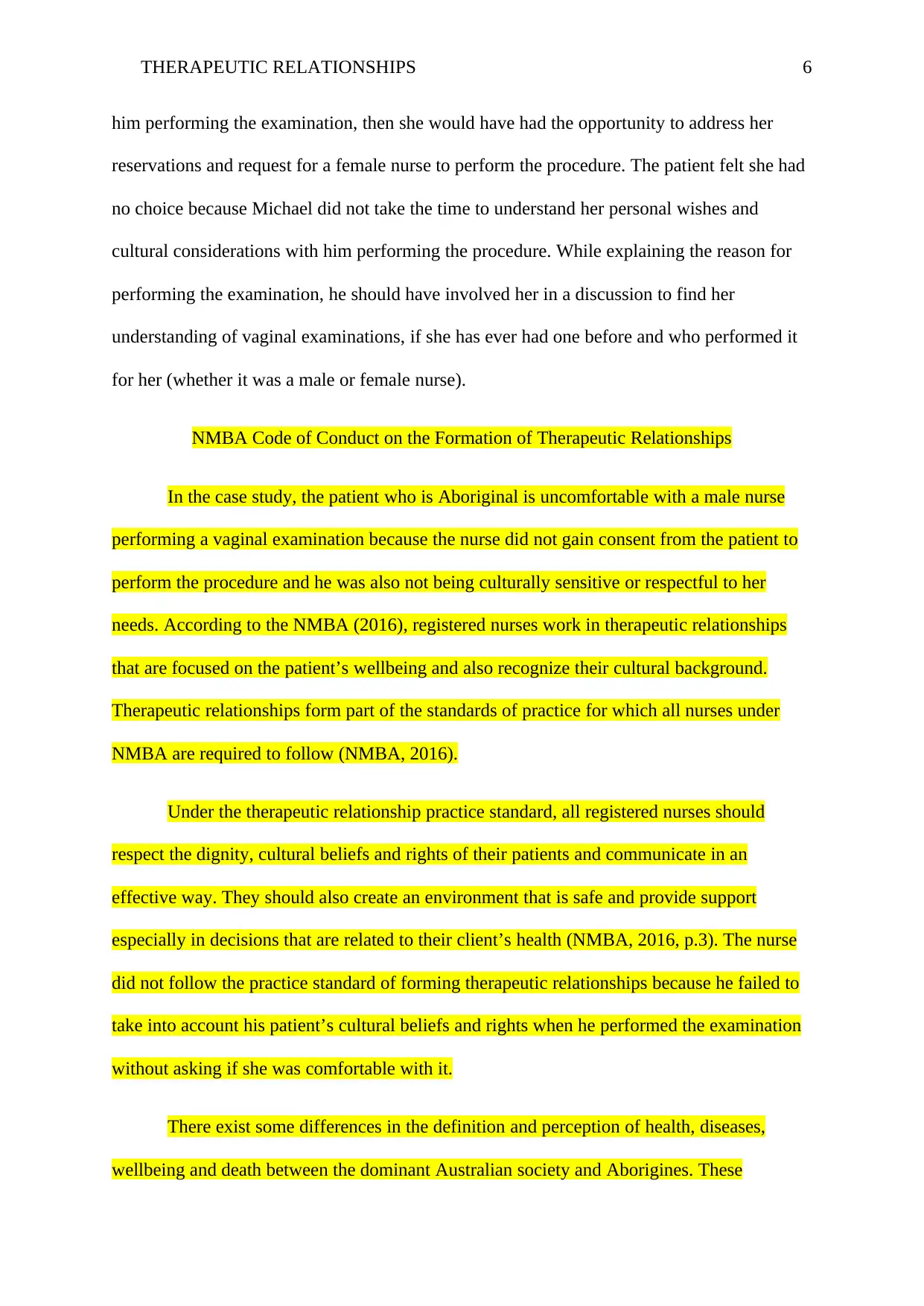
THERAPEUTIC RELATIONSHIPS 6
him performing the examination, then she would have had the opportunity to address her
reservations and request for a female nurse to perform the procedure. The patient felt she had
no choice because Michael did not take the time to understand her personal wishes and
cultural considerations with him performing the procedure. While explaining the reason for
performing the examination, he should have involved her in a discussion to find her
understanding of vaginal examinations, if she has ever had one before and who performed it
for her (whether it was a male or female nurse).
NMBA Code of Conduct on the Formation of Therapeutic Relationships
In the case study, the patient who is Aboriginal is uncomfortable with a male nurse
performing a vaginal examination because the nurse did not gain consent from the patient to
perform the procedure and he was also not being culturally sensitive or respectful to her
needs. According to the NMBA (2016), registered nurses work in therapeutic relationships
that are focused on the patient’s wellbeing and also recognize their cultural background.
Therapeutic relationships form part of the standards of practice for which all nurses under
NMBA are required to follow (NMBA, 2016).
Under the therapeutic relationship practice standard, all registered nurses should
respect the dignity, cultural beliefs and rights of their patients and communicate in an
effective way. They should also create an environment that is safe and provide support
especially in decisions that are related to their client’s health (NMBA, 2016, p.3). The nurse
did not follow the practice standard of forming therapeutic relationships because he failed to
take into account his patient’s cultural beliefs and rights when he performed the examination
without asking if she was comfortable with it.
There exist some differences in the definition and perception of health, diseases,
wellbeing and death between the dominant Australian society and Aborigines. These
him performing the examination, then she would have had the opportunity to address her
reservations and request for a female nurse to perform the procedure. The patient felt she had
no choice because Michael did not take the time to understand her personal wishes and
cultural considerations with him performing the procedure. While explaining the reason for
performing the examination, he should have involved her in a discussion to find her
understanding of vaginal examinations, if she has ever had one before and who performed it
for her (whether it was a male or female nurse).
NMBA Code of Conduct on the Formation of Therapeutic Relationships
In the case study, the patient who is Aboriginal is uncomfortable with a male nurse
performing a vaginal examination because the nurse did not gain consent from the patient to
perform the procedure and he was also not being culturally sensitive or respectful to her
needs. According to the NMBA (2016), registered nurses work in therapeutic relationships
that are focused on the patient’s wellbeing and also recognize their cultural background.
Therapeutic relationships form part of the standards of practice for which all nurses under
NMBA are required to follow (NMBA, 2016).
Under the therapeutic relationship practice standard, all registered nurses should
respect the dignity, cultural beliefs and rights of their patients and communicate in an
effective way. They should also create an environment that is safe and provide support
especially in decisions that are related to their client’s health (NMBA, 2016, p.3). The nurse
did not follow the practice standard of forming therapeutic relationships because he failed to
take into account his patient’s cultural beliefs and rights when he performed the examination
without asking if she was comfortable with it.
There exist some differences in the definition and perception of health, diseases,
wellbeing and death between the dominant Australian society and Aborigines. These
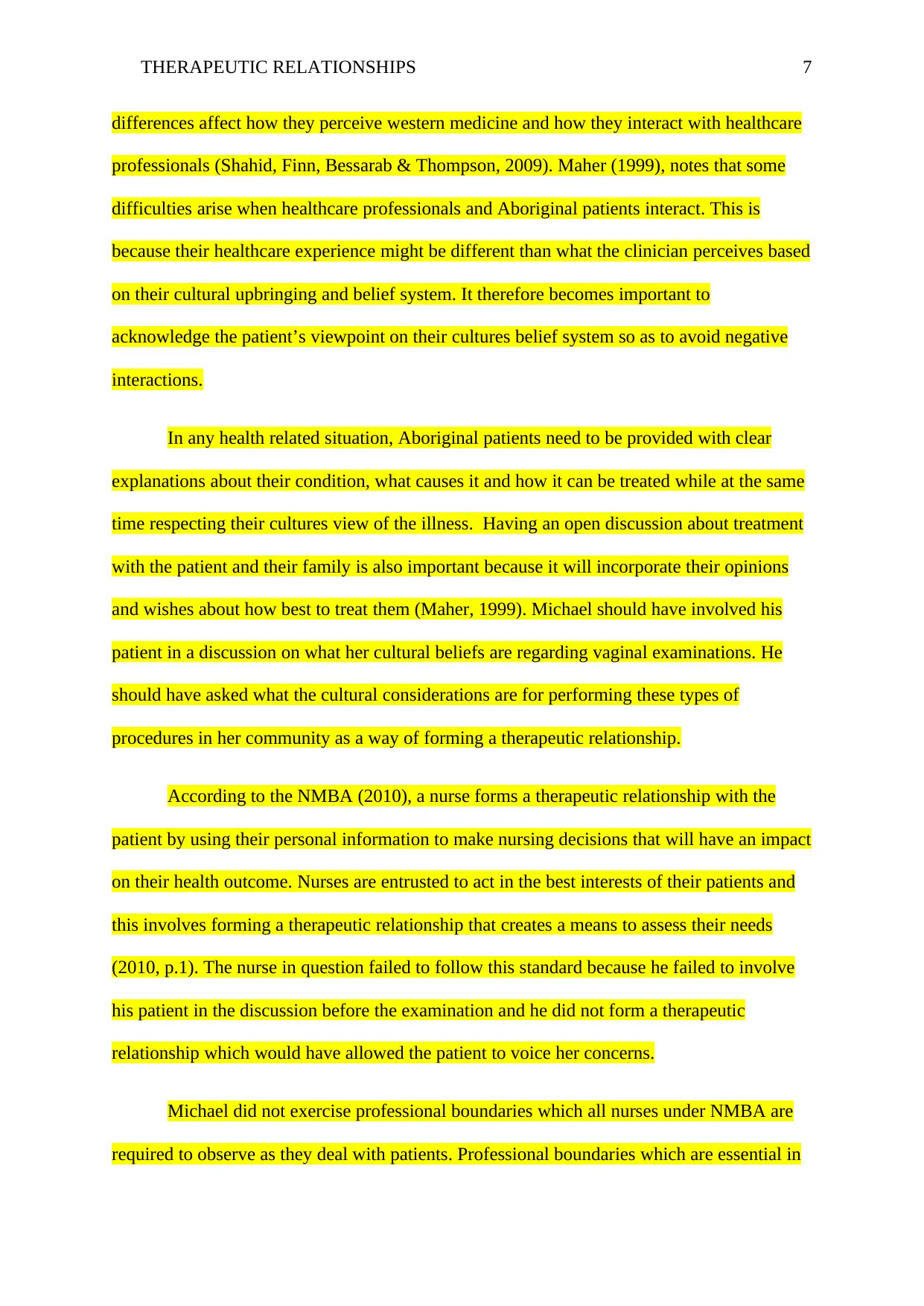
THERAPEUTIC RELATIONSHIPS 7
differences affect how they perceive western medicine and how they interact with healthcare
professionals (Shahid, Finn, Bessarab & Thompson, 2009). Maher (1999), notes that some
difficulties arise when healthcare professionals and Aboriginal patients interact. This is
because their healthcare experience might be different than what the clinician perceives based
on their cultural upbringing and belief system. It therefore becomes important to
acknowledge the patient’s viewpoint on their cultures belief system so as to avoid negative
interactions.
In any health related situation, Aboriginal patients need to be provided with clear
explanations about their condition, what causes it and how it can be treated while at the same
time respecting their cultures view of the illness. Having an open discussion about treatment
with the patient and their family is also important because it will incorporate their opinions
and wishes about how best to treat them (Maher, 1999). Michael should have involved his
patient in a discussion on what her cultural beliefs are regarding vaginal examinations. He
should have asked what the cultural considerations are for performing these types of
procedures in her community as a way of forming a therapeutic relationship.
According to the NMBA (2010), a nurse forms a therapeutic relationship with the
patient by using their personal information to make nursing decisions that will have an impact
on their health outcome. Nurses are entrusted to act in the best interests of their patients and
this involves forming a therapeutic relationship that creates a means to assess their needs
(2010, p.1). The nurse in question failed to follow this standard because he failed to involve
his patient in the discussion before the examination and he did not form a therapeutic
relationship which would have allowed the patient to voice her concerns.
Michael did not exercise professional boundaries which all nurses under NMBA are
required to observe as they deal with patients. Professional boundaries which are essential in
differences affect how they perceive western medicine and how they interact with healthcare
professionals (Shahid, Finn, Bessarab & Thompson, 2009). Maher (1999), notes that some
difficulties arise when healthcare professionals and Aboriginal patients interact. This is
because their healthcare experience might be different than what the clinician perceives based
on their cultural upbringing and belief system. It therefore becomes important to
acknowledge the patient’s viewpoint on their cultures belief system so as to avoid negative
interactions.
In any health related situation, Aboriginal patients need to be provided with clear
explanations about their condition, what causes it and how it can be treated while at the same
time respecting their cultures view of the illness. Having an open discussion about treatment
with the patient and their family is also important because it will incorporate their opinions
and wishes about how best to treat them (Maher, 1999). Michael should have involved his
patient in a discussion on what her cultural beliefs are regarding vaginal examinations. He
should have asked what the cultural considerations are for performing these types of
procedures in her community as a way of forming a therapeutic relationship.
According to the NMBA (2010), a nurse forms a therapeutic relationship with the
patient by using their personal information to make nursing decisions that will have an impact
on their health outcome. Nurses are entrusted to act in the best interests of their patients and
this involves forming a therapeutic relationship that creates a means to assess their needs
(2010, p.1). The nurse in question failed to follow this standard because he failed to involve
his patient in the discussion before the examination and he did not form a therapeutic
relationship which would have allowed the patient to voice her concerns.
Michael did not exercise professional boundaries which all nurses under NMBA are
required to observe as they deal with patients. Professional boundaries which are essential in
Paraphrase This Document
Need a fresh take? Get an instant paraphrase of this document with our AI Paraphraser
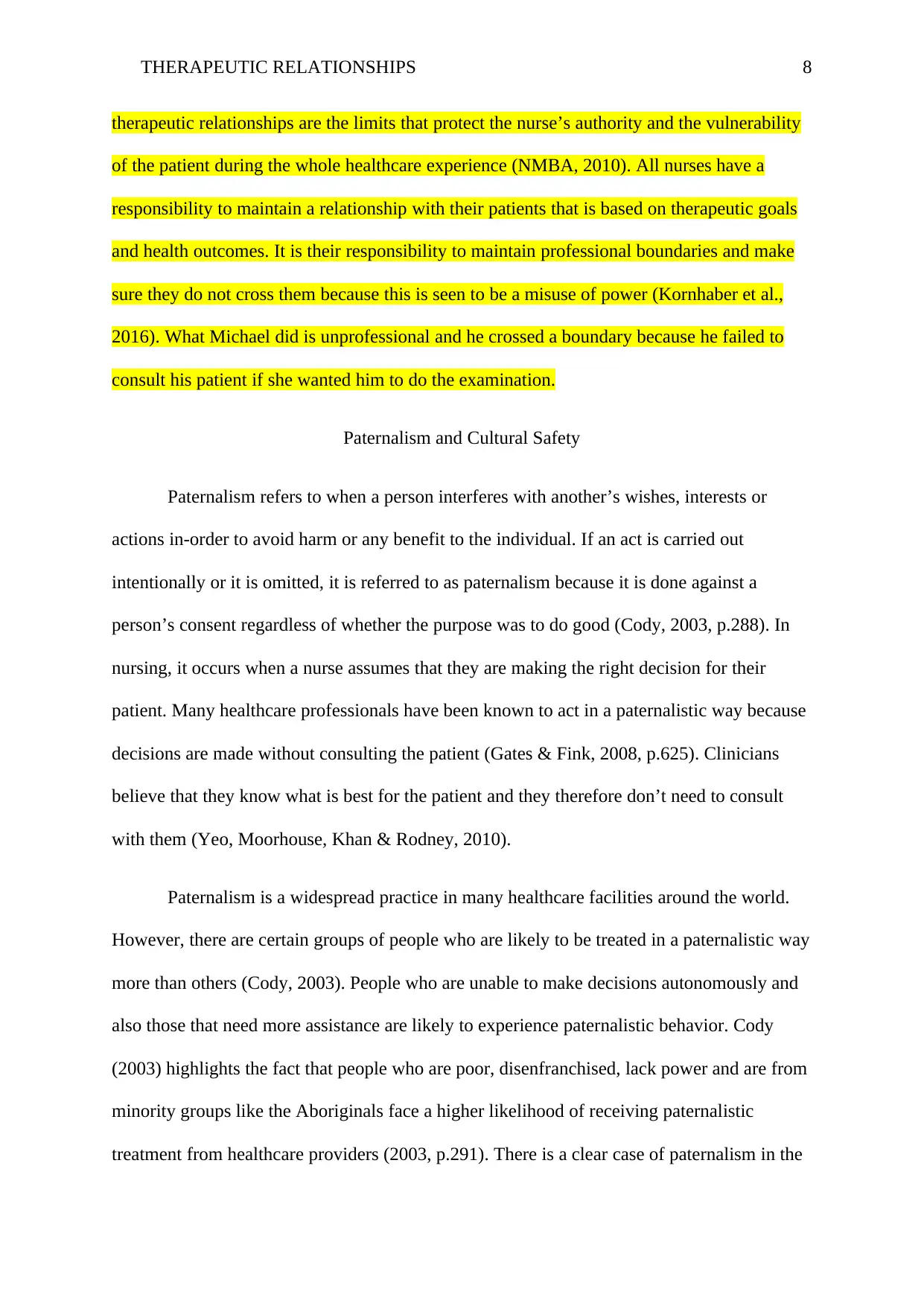
THERAPEUTIC RELATIONSHIPS 8
therapeutic relationships are the limits that protect the nurse’s authority and the vulnerability
of the patient during the whole healthcare experience (NMBA, 2010). All nurses have a
responsibility to maintain a relationship with their patients that is based on therapeutic goals
and health outcomes. It is their responsibility to maintain professional boundaries and make
sure they do not cross them because this is seen to be a misuse of power (Kornhaber et al.,
2016). What Michael did is unprofessional and he crossed a boundary because he failed to
consult his patient if she wanted him to do the examination.
Paternalism and Cultural Safety
Paternalism refers to when a person interferes with another’s wishes, interests or
actions in-order to avoid harm or any benefit to the individual. If an act is carried out
intentionally or it is omitted, it is referred to as paternalism because it is done against a
person’s consent regardless of whether the purpose was to do good (Cody, 2003, p.288). In
nursing, it occurs when a nurse assumes that they are making the right decision for their
patient. Many healthcare professionals have been known to act in a paternalistic way because
decisions are made without consulting the patient (Gates & Fink, 2008, p.625). Clinicians
believe that they know what is best for the patient and they therefore don’t need to consult
with them (Yeo, Moorhouse, Khan & Rodney, 2010).
Paternalism is a widespread practice in many healthcare facilities around the world.
However, there are certain groups of people who are likely to be treated in a paternalistic way
more than others (Cody, 2003). People who are unable to make decisions autonomously and
also those that need more assistance are likely to experience paternalistic behavior. Cody
(2003) highlights the fact that people who are poor, disenfranchised, lack power and are from
minority groups like the Aboriginals face a higher likelihood of receiving paternalistic
treatment from healthcare providers (2003, p.291). There is a clear case of paternalism in the
therapeutic relationships are the limits that protect the nurse’s authority and the vulnerability
of the patient during the whole healthcare experience (NMBA, 2010). All nurses have a
responsibility to maintain a relationship with their patients that is based on therapeutic goals
and health outcomes. It is their responsibility to maintain professional boundaries and make
sure they do not cross them because this is seen to be a misuse of power (Kornhaber et al.,
2016). What Michael did is unprofessional and he crossed a boundary because he failed to
consult his patient if she wanted him to do the examination.
Paternalism and Cultural Safety
Paternalism refers to when a person interferes with another’s wishes, interests or
actions in-order to avoid harm or any benefit to the individual. If an act is carried out
intentionally or it is omitted, it is referred to as paternalism because it is done against a
person’s consent regardless of whether the purpose was to do good (Cody, 2003, p.288). In
nursing, it occurs when a nurse assumes that they are making the right decision for their
patient. Many healthcare professionals have been known to act in a paternalistic way because
decisions are made without consulting the patient (Gates & Fink, 2008, p.625). Clinicians
believe that they know what is best for the patient and they therefore don’t need to consult
with them (Yeo, Moorhouse, Khan & Rodney, 2010).
Paternalism is a widespread practice in many healthcare facilities around the world.
However, there are certain groups of people who are likely to be treated in a paternalistic way
more than others (Cody, 2003). People who are unable to make decisions autonomously and
also those that need more assistance are likely to experience paternalistic behavior. Cody
(2003) highlights the fact that people who are poor, disenfranchised, lack power and are from
minority groups like the Aboriginals face a higher likelihood of receiving paternalistic
treatment from healthcare providers (2003, p.291). There is a clear case of paternalism in the
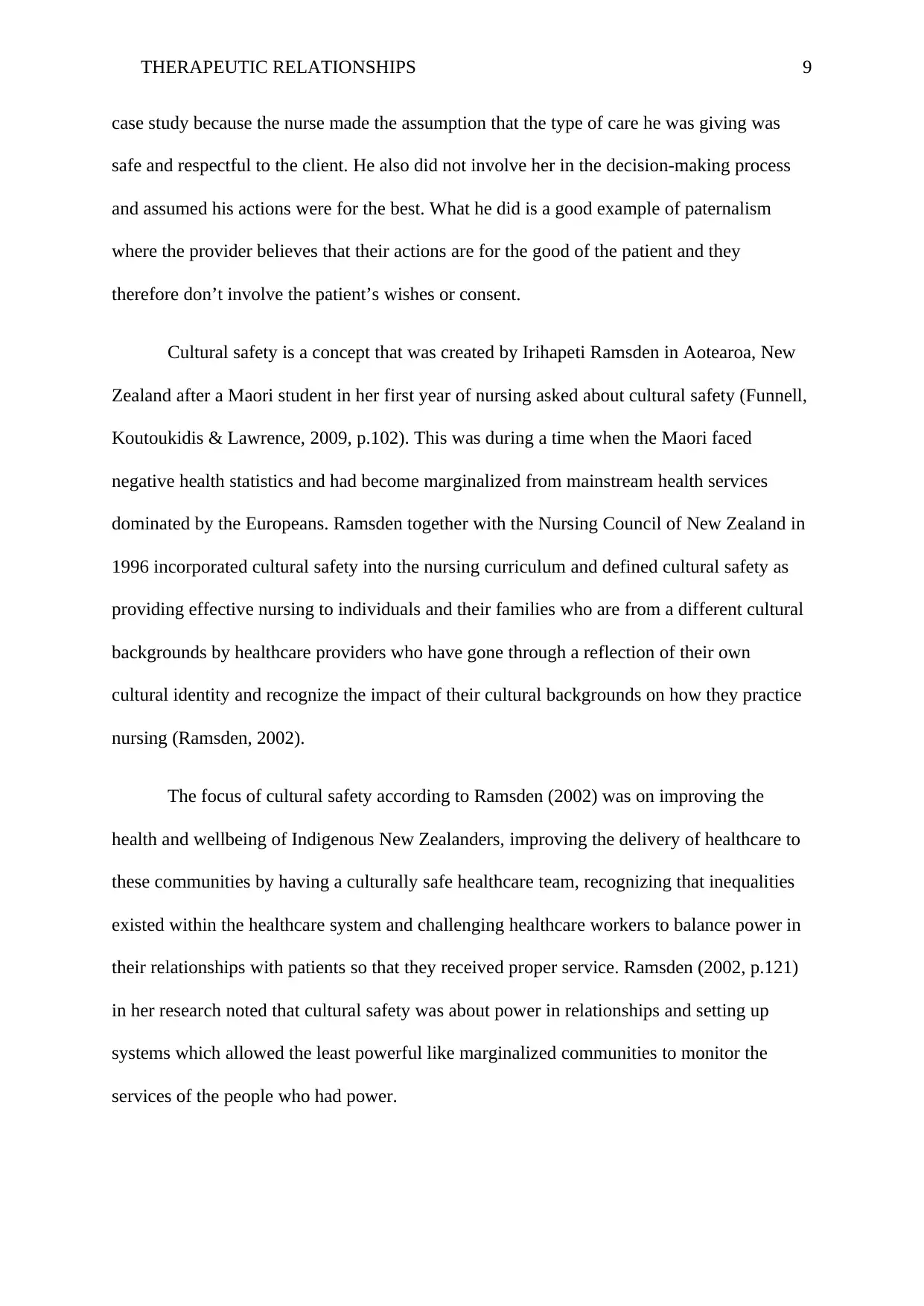
THERAPEUTIC RELATIONSHIPS 9
case study because the nurse made the assumption that the type of care he was giving was
safe and respectful to the client. He also did not involve her in the decision-making process
and assumed his actions were for the best. What he did is a good example of paternalism
where the provider believes that their actions are for the good of the patient and they
therefore don’t involve the patient’s wishes or consent.
Cultural safety is a concept that was created by Irihapeti Ramsden in Aotearoa, New
Zealand after a Maori student in her first year of nursing asked about cultural safety (Funnell,
Koutoukidis & Lawrence, 2009, p.102). This was during a time when the Maori faced
negative health statistics and had become marginalized from mainstream health services
dominated by the Europeans. Ramsden together with the Nursing Council of New Zealand in
1996 incorporated cultural safety into the nursing curriculum and defined cultural safety as
providing effective nursing to individuals and their families who are from a different cultural
backgrounds by healthcare providers who have gone through a reflection of their own
cultural identity and recognize the impact of their cultural backgrounds on how they practice
nursing (Ramsden, 2002).
The focus of cultural safety according to Ramsden (2002) was on improving the
health and wellbeing of Indigenous New Zealanders, improving the delivery of healthcare to
these communities by having a culturally safe healthcare team, recognizing that inequalities
existed within the healthcare system and challenging healthcare workers to balance power in
their relationships with patients so that they received proper service. Ramsden (2002, p.121)
in her research noted that cultural safety was about power in relationships and setting up
systems which allowed the least powerful like marginalized communities to monitor the
services of the people who had power.
case study because the nurse made the assumption that the type of care he was giving was
safe and respectful to the client. He also did not involve her in the decision-making process
and assumed his actions were for the best. What he did is a good example of paternalism
where the provider believes that their actions are for the good of the patient and they
therefore don’t involve the patient’s wishes or consent.
Cultural safety is a concept that was created by Irihapeti Ramsden in Aotearoa, New
Zealand after a Maori student in her first year of nursing asked about cultural safety (Funnell,
Koutoukidis & Lawrence, 2009, p.102). This was during a time when the Maori faced
negative health statistics and had become marginalized from mainstream health services
dominated by the Europeans. Ramsden together with the Nursing Council of New Zealand in
1996 incorporated cultural safety into the nursing curriculum and defined cultural safety as
providing effective nursing to individuals and their families who are from a different cultural
backgrounds by healthcare providers who have gone through a reflection of their own
cultural identity and recognize the impact of their cultural backgrounds on how they practice
nursing (Ramsden, 2002).
The focus of cultural safety according to Ramsden (2002) was on improving the
health and wellbeing of Indigenous New Zealanders, improving the delivery of healthcare to
these communities by having a culturally safe healthcare team, recognizing that inequalities
existed within the healthcare system and challenging healthcare workers to balance power in
their relationships with patients so that they received proper service. Ramsden (2002, p.121)
in her research noted that cultural safety was about power in relationships and setting up
systems which allowed the least powerful like marginalized communities to monitor the
services of the people who had power.
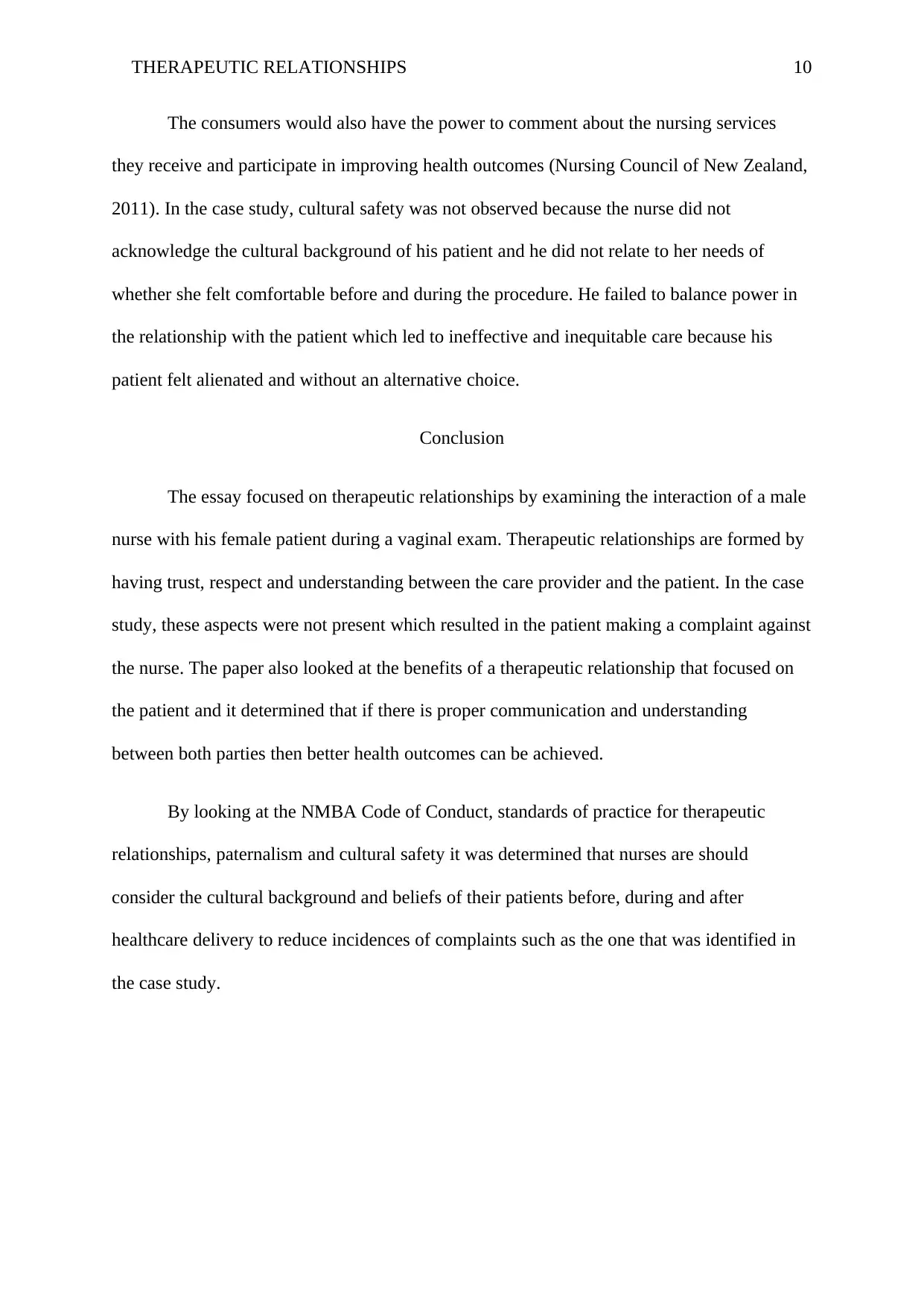
THERAPEUTIC RELATIONSHIPS 10
The consumers would also have the power to comment about the nursing services
they receive and participate in improving health outcomes (Nursing Council of New Zealand,
2011). In the case study, cultural safety was not observed because the nurse did not
acknowledge the cultural background of his patient and he did not relate to her needs of
whether she felt comfortable before and during the procedure. He failed to balance power in
the relationship with the patient which led to ineffective and inequitable care because his
patient felt alienated and without an alternative choice.
Conclusion
The essay focused on therapeutic relationships by examining the interaction of a male
nurse with his female patient during a vaginal exam. Therapeutic relationships are formed by
having trust, respect and understanding between the care provider and the patient. In the case
study, these aspects were not present which resulted in the patient making a complaint against
the nurse. The paper also looked at the benefits of a therapeutic relationship that focused on
the patient and it determined that if there is proper communication and understanding
between both parties then better health outcomes can be achieved.
By looking at the NMBA Code of Conduct, standards of practice for therapeutic
relationships, paternalism and cultural safety it was determined that nurses are should
consider the cultural background and beliefs of their patients before, during and after
healthcare delivery to reduce incidences of complaints such as the one that was identified in
the case study.
The consumers would also have the power to comment about the nursing services
they receive and participate in improving health outcomes (Nursing Council of New Zealand,
2011). In the case study, cultural safety was not observed because the nurse did not
acknowledge the cultural background of his patient and he did not relate to her needs of
whether she felt comfortable before and during the procedure. He failed to balance power in
the relationship with the patient which led to ineffective and inequitable care because his
patient felt alienated and without an alternative choice.
Conclusion
The essay focused on therapeutic relationships by examining the interaction of a male
nurse with his female patient during a vaginal exam. Therapeutic relationships are formed by
having trust, respect and understanding between the care provider and the patient. In the case
study, these aspects were not present which resulted in the patient making a complaint against
the nurse. The paper also looked at the benefits of a therapeutic relationship that focused on
the patient and it determined that if there is proper communication and understanding
between both parties then better health outcomes can be achieved.
By looking at the NMBA Code of Conduct, standards of practice for therapeutic
relationships, paternalism and cultural safety it was determined that nurses are should
consider the cultural background and beliefs of their patients before, during and after
healthcare delivery to reduce incidences of complaints such as the one that was identified in
the case study.
Secure Best Marks with AI Grader
Need help grading? Try our AI Grader for instant feedback on your assignments.
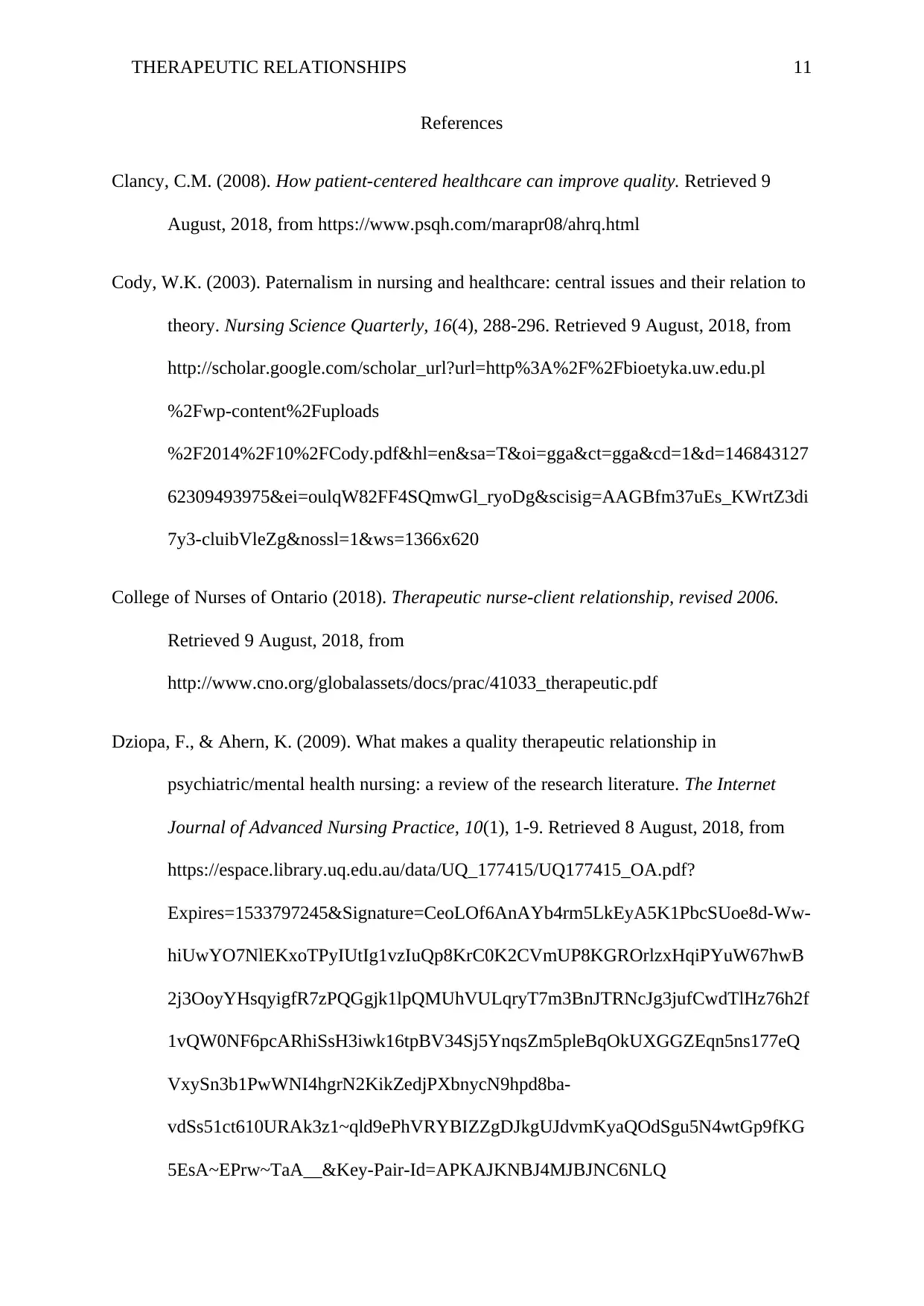
THERAPEUTIC RELATIONSHIPS 11
References
Clancy, C.M. (2008). How patient-centered healthcare can improve quality. Retrieved 9
August, 2018, from https://www.psqh.com/marapr08/ahrq.html
Cody, W.K. (2003). Paternalism in nursing and healthcare: central issues and their relation to
theory. Nursing Science Quarterly, 16(4), 288-296. Retrieved 9 August, 2018, from
http://scholar.google.com/scholar_url?url=http%3A%2F%2Fbioetyka.uw.edu.pl
%2Fwp-content%2Fuploads
%2F2014%2F10%2FCody.pdf&hl=en&sa=T&oi=gga&ct=gga&cd=1&d=146843127
62309493975&ei=oulqW82FF4SQmwGl_ryoDg&scisig=AAGBfm37uEs_KWrtZ3di
7y3-cluibVleZg&nossl=1&ws=1366x620
College of Nurses of Ontario (2018). Therapeutic nurse-client relationship, revised 2006.
Retrieved 9 August, 2018, from
http://www.cno.org/globalassets/docs/prac/41033_therapeutic.pdf
Dziopa, F., & Ahern, K. (2009). What makes a quality therapeutic relationship in
psychiatric/mental health nursing: a review of the research literature. The Internet
Journal of Advanced Nursing Practice, 10(1), 1-9. Retrieved 8 August, 2018, from
https://espace.library.uq.edu.au/data/UQ_177415/UQ177415_OA.pdf?
Expires=1533797245&Signature=CeoLOf6AnAYb4rm5LkEyA5K1PbcSUoe8d-Ww-
hiUwYO7NlEKxoTPyIUtIg1vzIuQp8KrC0K2CVmUP8KGROrlzxHqiPYuW67hwB
2j3OoyYHsqyigfR7zPQGgjk1lpQMUhVULqryT7m3BnJTRNcJg3jufCwdTlHz76h2f
1vQW0NF6pcARhiSsH3iwk16tpBV34Sj5YnqsZm5pleBqOkUXGGZEqn5ns177eQ
VxySn3b1PwWNI4hgrN2KikZedjPXbnycN9hpd8ba-
vdSs51ct610URAk3z1~qld9ePhVRYBIZZgDJkgUJdvmKyaQOdSgu5N4wtGp9fKG
5EsA~EPrw~TaA__&Key-Pair-Id=APKAJKNBJ4MJBJNC6NLQ
References
Clancy, C.M. (2008). How patient-centered healthcare can improve quality. Retrieved 9
August, 2018, from https://www.psqh.com/marapr08/ahrq.html
Cody, W.K. (2003). Paternalism in nursing and healthcare: central issues and their relation to
theory. Nursing Science Quarterly, 16(4), 288-296. Retrieved 9 August, 2018, from
http://scholar.google.com/scholar_url?url=http%3A%2F%2Fbioetyka.uw.edu.pl
%2Fwp-content%2Fuploads
%2F2014%2F10%2FCody.pdf&hl=en&sa=T&oi=gga&ct=gga&cd=1&d=146843127
62309493975&ei=oulqW82FF4SQmwGl_ryoDg&scisig=AAGBfm37uEs_KWrtZ3di
7y3-cluibVleZg&nossl=1&ws=1366x620
College of Nurses of Ontario (2018). Therapeutic nurse-client relationship, revised 2006.
Retrieved 9 August, 2018, from
http://www.cno.org/globalassets/docs/prac/41033_therapeutic.pdf
Dziopa, F., & Ahern, K. (2009). What makes a quality therapeutic relationship in
psychiatric/mental health nursing: a review of the research literature. The Internet
Journal of Advanced Nursing Practice, 10(1), 1-9. Retrieved 8 August, 2018, from
https://espace.library.uq.edu.au/data/UQ_177415/UQ177415_OA.pdf?
Expires=1533797245&Signature=CeoLOf6AnAYb4rm5LkEyA5K1PbcSUoe8d-Ww-
hiUwYO7NlEKxoTPyIUtIg1vzIuQp8KrC0K2CVmUP8KGROrlzxHqiPYuW67hwB
2j3OoyYHsqyigfR7zPQGgjk1lpQMUhVULqryT7m3BnJTRNcJg3jufCwdTlHz76h2f
1vQW0NF6pcARhiSsH3iwk16tpBV34Sj5YnqsZm5pleBqOkUXGGZEqn5ns177eQ
VxySn3b1PwWNI4hgrN2KikZedjPXbnycN9hpd8ba-
vdSs51ct610URAk3z1~qld9ePhVRYBIZZgDJkgUJdvmKyaQOdSgu5N4wtGp9fKG
5EsA~EPrw~TaA__&Key-Pair-Id=APKAJKNBJ4MJBJNC6NLQ
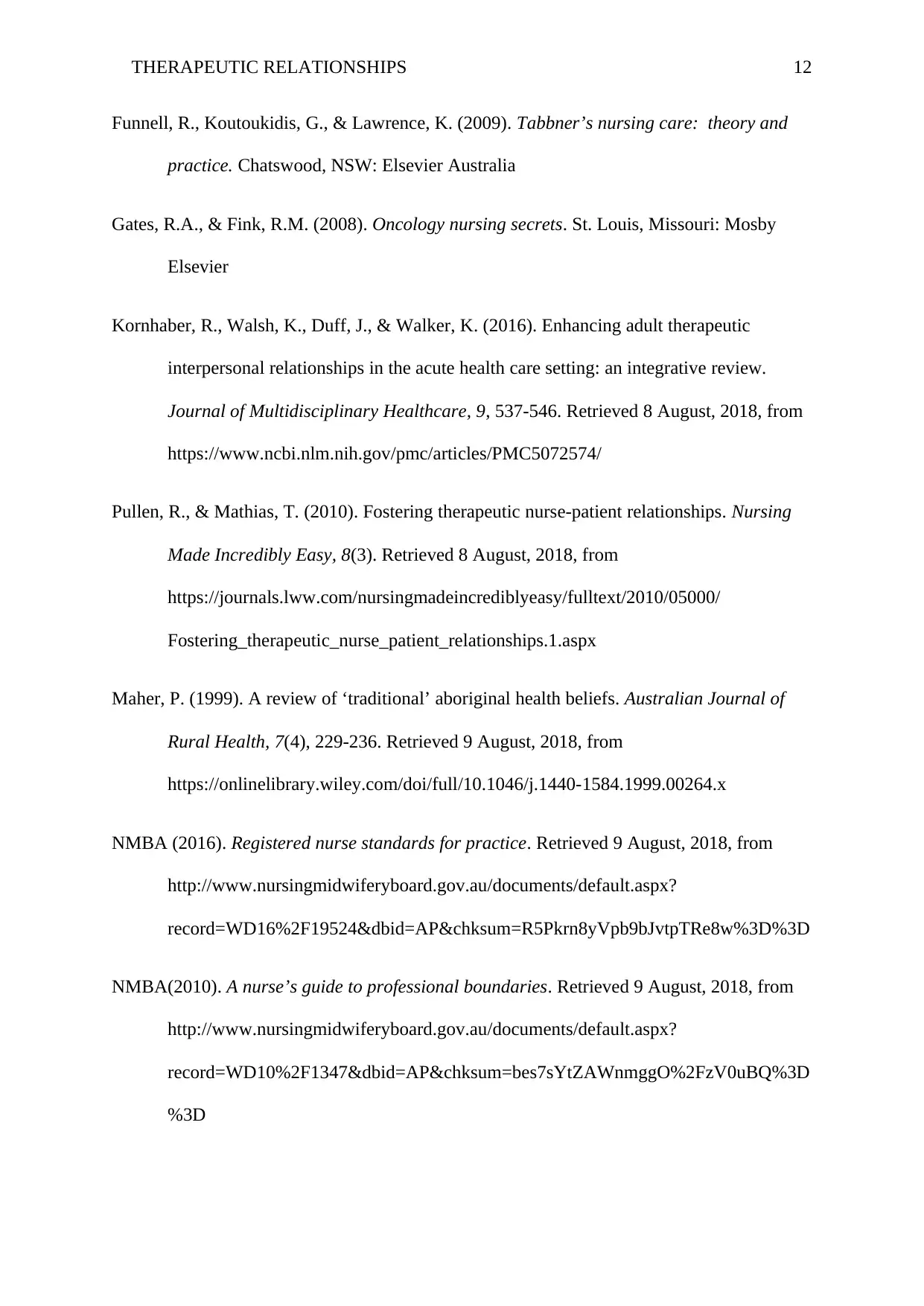
THERAPEUTIC RELATIONSHIPS 12
Funnell, R., Koutoukidis, G., & Lawrence, K. (2009). Tabbner’s nursing care: theory and
practice. Chatswood, NSW: Elsevier Australia
Gates, R.A., & Fink, R.M. (2008). Oncology nursing secrets. St. Louis, Missouri: Mosby
Elsevier
Kornhaber, R., Walsh, K., Duff, J., & Walker, K. (2016). Enhancing adult therapeutic
interpersonal relationships in the acute health care setting: an integrative review.
Journal of Multidisciplinary Healthcare, 9, 537-546. Retrieved 8 August, 2018, from
https://www.ncbi.nlm.nih.gov/pmc/articles/PMC5072574/
Pullen, R., & Mathias, T. (2010). Fostering therapeutic nurse-patient relationships. Nursing
Made Incredibly Easy, 8(3). Retrieved 8 August, 2018, from
https://journals.lww.com/nursingmadeincrediblyeasy/fulltext/2010/05000/
Fostering_therapeutic_nurse_patient_relationships.1.aspx
Maher, P. (1999). A review of ‘traditional’ aboriginal health beliefs. Australian Journal of
Rural Health, 7(4), 229-236. Retrieved 9 August, 2018, from
https://onlinelibrary.wiley.com/doi/full/10.1046/j.1440-1584.1999.00264.x
NMBA (2016). Registered nurse standards for practice. Retrieved 9 August, 2018, from
http://www.nursingmidwiferyboard.gov.au/documents/default.aspx?
record=WD16%2F19524&dbid=AP&chksum=R5Pkrn8yVpb9bJvtpTRe8w%3D%3D
NMBA(2010). A nurse’s guide to professional boundaries. Retrieved 9 August, 2018, from
http://www.nursingmidwiferyboard.gov.au/documents/default.aspx?
record=WD10%2F1347&dbid=AP&chksum=bes7sYtZAWnmggO%2FzV0uBQ%3D
%3D
Funnell, R., Koutoukidis, G., & Lawrence, K. (2009). Tabbner’s nursing care: theory and
practice. Chatswood, NSW: Elsevier Australia
Gates, R.A., & Fink, R.M. (2008). Oncology nursing secrets. St. Louis, Missouri: Mosby
Elsevier
Kornhaber, R., Walsh, K., Duff, J., & Walker, K. (2016). Enhancing adult therapeutic
interpersonal relationships in the acute health care setting: an integrative review.
Journal of Multidisciplinary Healthcare, 9, 537-546. Retrieved 8 August, 2018, from
https://www.ncbi.nlm.nih.gov/pmc/articles/PMC5072574/
Pullen, R., & Mathias, T. (2010). Fostering therapeutic nurse-patient relationships. Nursing
Made Incredibly Easy, 8(3). Retrieved 8 August, 2018, from
https://journals.lww.com/nursingmadeincrediblyeasy/fulltext/2010/05000/
Fostering_therapeutic_nurse_patient_relationships.1.aspx
Maher, P. (1999). A review of ‘traditional’ aboriginal health beliefs. Australian Journal of
Rural Health, 7(4), 229-236. Retrieved 9 August, 2018, from
https://onlinelibrary.wiley.com/doi/full/10.1046/j.1440-1584.1999.00264.x
NMBA (2016). Registered nurse standards for practice. Retrieved 9 August, 2018, from
http://www.nursingmidwiferyboard.gov.au/documents/default.aspx?
record=WD16%2F19524&dbid=AP&chksum=R5Pkrn8yVpb9bJvtpTRe8w%3D%3D
NMBA(2010). A nurse’s guide to professional boundaries. Retrieved 9 August, 2018, from
http://www.nursingmidwiferyboard.gov.au/documents/default.aspx?
record=WD10%2F1347&dbid=AP&chksum=bes7sYtZAWnmggO%2FzV0uBQ%3D
%3D
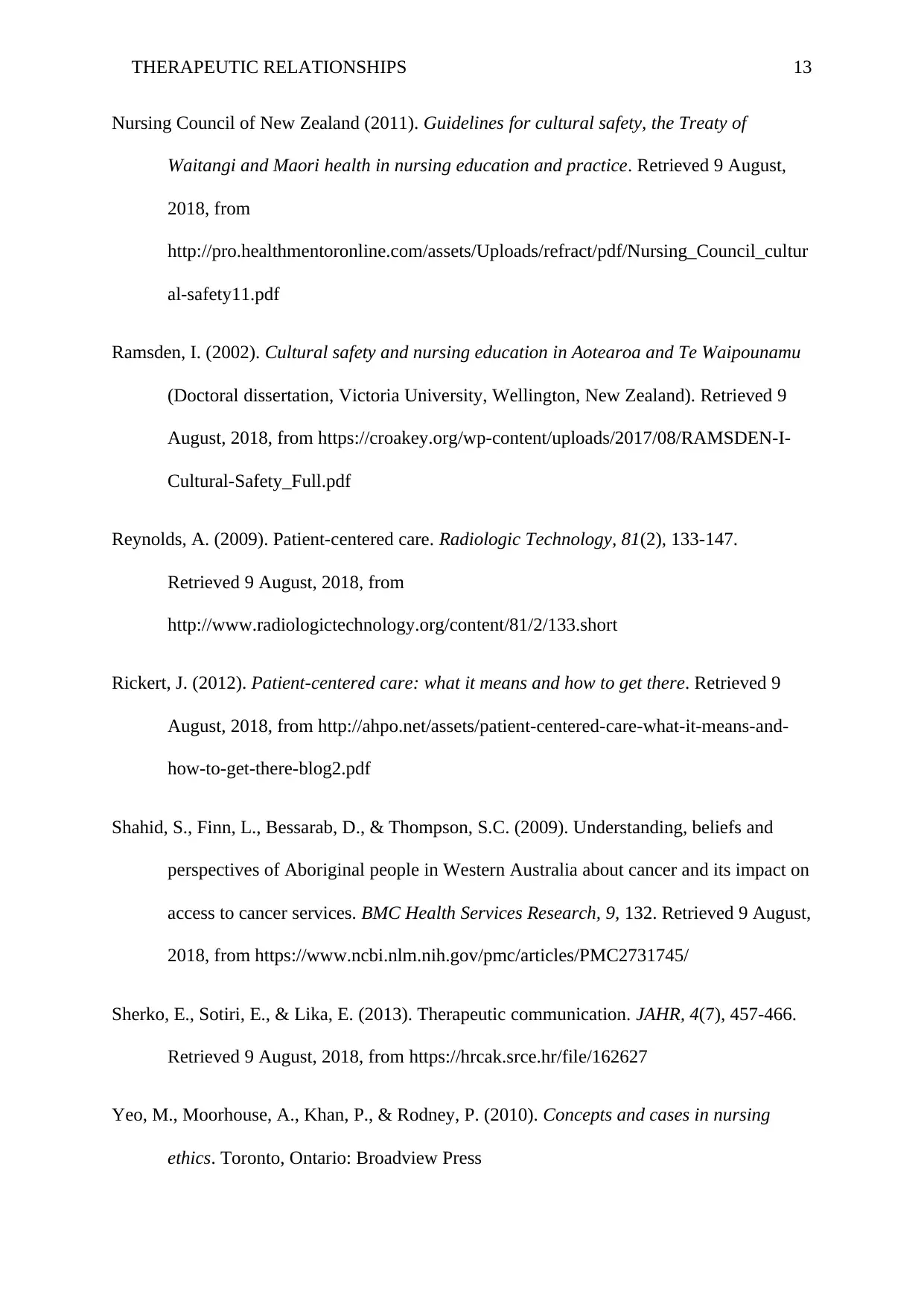
THERAPEUTIC RELATIONSHIPS 13
Nursing Council of New Zealand (2011). Guidelines for cultural safety, the Treaty of
Waitangi and Maori health in nursing education and practice. Retrieved 9 August,
2018, from
http://pro.healthmentoronline.com/assets/Uploads/refract/pdf/Nursing_Council_cultur
al-safety11.pdf
Ramsden, I. (2002). Cultural safety and nursing education in Aotearoa and Te Waipounamu
(Doctoral dissertation, Victoria University, Wellington, New Zealand). Retrieved 9
August, 2018, from https://croakey.org/wp-content/uploads/2017/08/RAMSDEN-I-
Cultural-Safety_Full.pdf
Reynolds, A. (2009). Patient-centered care. Radiologic Technology, 81(2), 133-147.
Retrieved 9 August, 2018, from
http://www.radiologictechnology.org/content/81/2/133.short
Rickert, J. (2012). Patient-centered care: what it means and how to get there. Retrieved 9
August, 2018, from http://ahpo.net/assets/patient-centered-care-what-it-means-and-
how-to-get-there-blog2.pdf
Shahid, S., Finn, L., Bessarab, D., & Thompson, S.C. (2009). Understanding, beliefs and
perspectives of Aboriginal people in Western Australia about cancer and its impact on
access to cancer services. BMC Health Services Research, 9, 132. Retrieved 9 August,
2018, from https://www.ncbi.nlm.nih.gov/pmc/articles/PMC2731745/
Sherko, E., Sotiri, E., & Lika, E. (2013). Therapeutic communication. JAHR, 4(7), 457-466.
Retrieved 9 August, 2018, from https://hrcak.srce.hr/file/162627
Yeo, M., Moorhouse, A., Khan, P., & Rodney, P. (2010). Concepts and cases in nursing
ethics. Toronto, Ontario: Broadview Press
Nursing Council of New Zealand (2011). Guidelines for cultural safety, the Treaty of
Waitangi and Maori health in nursing education and practice. Retrieved 9 August,
2018, from
http://pro.healthmentoronline.com/assets/Uploads/refract/pdf/Nursing_Council_cultur
al-safety11.pdf
Ramsden, I. (2002). Cultural safety and nursing education in Aotearoa and Te Waipounamu
(Doctoral dissertation, Victoria University, Wellington, New Zealand). Retrieved 9
August, 2018, from https://croakey.org/wp-content/uploads/2017/08/RAMSDEN-I-
Cultural-Safety_Full.pdf
Reynolds, A. (2009). Patient-centered care. Radiologic Technology, 81(2), 133-147.
Retrieved 9 August, 2018, from
http://www.radiologictechnology.org/content/81/2/133.short
Rickert, J. (2012). Patient-centered care: what it means and how to get there. Retrieved 9
August, 2018, from http://ahpo.net/assets/patient-centered-care-what-it-means-and-
how-to-get-there-blog2.pdf
Shahid, S., Finn, L., Bessarab, D., & Thompson, S.C. (2009). Understanding, beliefs and
perspectives of Aboriginal people in Western Australia about cancer and its impact on
access to cancer services. BMC Health Services Research, 9, 132. Retrieved 9 August,
2018, from https://www.ncbi.nlm.nih.gov/pmc/articles/PMC2731745/
Sherko, E., Sotiri, E., & Lika, E. (2013). Therapeutic communication. JAHR, 4(7), 457-466.
Retrieved 9 August, 2018, from https://hrcak.srce.hr/file/162627
Yeo, M., Moorhouse, A., Khan, P., & Rodney, P. (2010). Concepts and cases in nursing
ethics. Toronto, Ontario: Broadview Press
Paraphrase This Document
Need a fresh take? Get an instant paraphrase of this document with our AI Paraphraser

THERAPEUTIC RELATIONSHIPS 14
1 out of 14
Related Documents
Your All-in-One AI-Powered Toolkit for Academic Success.
+13062052269
info@desklib.com
Available 24*7 on WhatsApp / Email
![[object Object]](/_next/static/media/star-bottom.7253800d.svg)
Unlock your academic potential
© 2024 | Zucol Services PVT LTD | All rights reserved.




